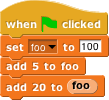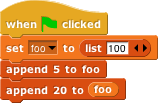

Suppose I have a global variable named
foo
, and I define the following two blocks:


Now I run the following script:

Will the final value of foo be 100? 105? 120? or 125? Try it and see.
Now do the following similar experiment, but with a list as the value of
foo
:



What items will be in
foo
after running this script?
Why do these two experiments give different results?
It's not surprising that the two blocks that specifically change the global variable
foo
succeed. But how come you can add a new item to a list passed into a block as input, whereas you can't change a numeric variable passed in as input?
Snap! is actually behaving consistently in these two cases. To understand why, you have to keep clear in your mind the difference between a value–a number, text string, Boolean (true/false), or list–and a variable, which is essentially a connection between a name and a value. (This is not precisely the definition of "variable" you'd learn in a programming language design course, but it's close enough until you have to implement a programming language yourself.)
As in most programming languages, the inputs you provide to a block in a Snap! program are values. The block doesn't know how the value was provided: typed directly into an input slot, computed by a reporter dragged into the slot, or taken from a variable dragged into the slot.
If that went over your head because it's too abstract, consider this script:

You wouldn't expect that to change the value of
foo
to— To what? 123? 117? It just doesn't make sense to expect this to change
foo
at all. The input to the
add 20 to
block is the number 103–the value of  –not the variable. The same is true in the original experiment; the input to
–not the variable. The same is true in the original experiment; the input to
add 20 to
is the number 105 (because the
add 5 to foo
block specifically changed
foo
), not the variable
foo
itself.
The
change
block in the definition of
add 20 to
does change a variable: the variable it says it changes, namely
var
. That variable is local to the block's defining script, so changing it doesn't affect the rest of the program at all. Local variables are temporary; when the block finishes, the variable is gone.
What if the value of
foo
is a list? Unlike numbers, lists themselves are mutable. (Variables are mutable, too, which is why we're having this discussion, but only when the variable name itself appears in a
set
or
change
block.) After the two
append
blocks in the second experiment are run, the value associated with variable
foo
is the same list as it was before. But that list now has more elements. We say that it "maintains its identity" even though its contents have changed.